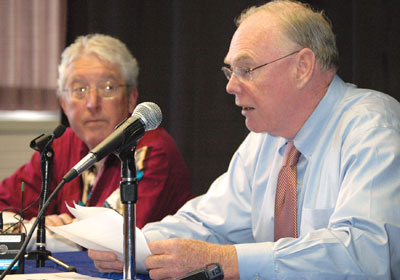University Communications and Marketing
Montanans like idea of healthcare reform, but unsure of its effects, latest MSU Billings poll shows
November 17, 2009
Contacts:
Dr. Craig Wilson, political science, 657-2995
Dr. Dan Lennon, sociology, 657-2915
Dr. Scott Rickard, Center for Applied Economic Research, 657-1763
Dan Carter, University Relations, 657-2269
Approval rating for President Obama at 37 percent
MSU BILLINGS NEWS SERVICES — Many Montanans like the idea of healthcare reform that includes a public option, but aren’t necessarily sure if that change improve overall healthcare, according to a new poll done by Montana State University Billings.
“Montanans aren’t unalterably opposed to a healthcare reform plan, said Dr. Craig Wilson, a professor of political science at MSU Billings and one of the co-directors of the poll. “But they’re scared because they don’t know what’s in it.”
 Meanwhile, a majority of people polled show they disapprove of the overall job performance
of President Barack Obama.
Meanwhile, a majority of people polled show they disapprove of the overall job performance
of President Barack Obama.
The poll, now in its 21st year, was conducted through a statewide random sample telephone survey on Nov. 5-8 with 414 Montanans. It has a margin of error of plus or minus 5 percent.
Wilson and co-directors Dr. Dan Lennon (a sociologist at MSU Billings) and Dr. Scott Rickard (director of the Center for Applied Economic Research) released the poll over two days this week.
The healthcare reform issue has been a major topic in American politics for the past six months as Congress has wrestled with varying ideas to address costs and quality of care. The poll shows that 48 percent of the respondents think that a healthcare reform plan should include a public option while 42 percent were opposed to a public option.
Yet the poll also showed that 74 percent of people interviewed said they believed that passage of a reform plan would make the quality of healthcare somewhat worse.
That apparent inconsistency is not really a surprise, said Wilson, mostly because full resolution to the healthcare reform has yet to materialize. While the House passed a bill outlining reform, the Senate has yet to take up its version of a plan.
“Montanans are kind of conflicted,” he said. “They may like the ideas (in healthcare reform), but they fear it’s not going to be good.”
Among the statistically significant relationships in the healthcare questions:
- A majority (72.7 percent) of Democrats backed a public option while a majority (60.1 percent) of Republicans and a plurality (47.9 percent) of independents opposed the policy.
- Those who are over the age of 60 are more tend to oppose the public option in the poll. While 37.9 percent of those who support a public option were 60 years old or older, 45.3 percent of those opposed to the public option were in this same age cohort.
- More males (48.5 percent) than females (46.6 percent) supported a public option.
In questions related to the president’s overall job performance, 53 percent of those interviewed said they disapproved, while 37 percent approved and 10 percent remained undecided.
This was the first MSU Billings poll that gathered opinions on President Obama. By comparison, former President George W. Bush’s highest approval rating (87 percent) was found in 2001 in the wake of the Sept. 11 terrorist attacks and the invasion of Afghanistan. In the 2008 poll, 60 percent of those surveyed disapproved of Bush’s job performance.
In specific categories, Montanans are evenly split on how the president handles foreign relations, with 42 percent saying he’s doing a good job and 42 percent saying they thought he is doing a bad job. As far as the economy, however, 56 percent of those polled said Obama is doing a bad job on managing the U.S. economy. Thirty-five percent said they thought he was doing a good job while 9 percent said they were undecided.
In other issues:
- Montanans remain opposed to the economic stimulus package passed by Congress. Last year, 50.8 percent of those interviewed replied “no” when asked if they supported or opposed passage of a federal economic stimulus package. This year, 61 percent said they opposed the passage of the $800 billion package, while 28 percent supported it.
- Most people favor sending more U.S. combat troops to Afghanistan. A plurality (48 percent) of those interviewed said they supported the idea while 37 percent opposed it and 15 percent are undecided. Most Democrats (49 percent) and independents (41.7 percent) opposed the idea while a majority of Republicans (64.6 percent) backed the additional forces.
- Few people want to bring Guantanamo Bay prisoners to the United States for trial. The majority of those polled (52 percent) were opposed to bringing detainees to the U.S. for trial, while 35 percent supported it.
- While there has been much coverage of H1N1, most people were not personally concerned about contracting the H1N1 virus. When “how concerned” they were with contracting the H1N1 flu, 74 percent responded “to some extent not concerned” while only 26 percent responded “to some extent concerned.”
This is the 21st year that MSU Billings has conducted an opinion poll as part of its political science program. It is the only political science program in the Montana University System where students do the full scope of political science polling, Wilson and Lennon said.
Nearly 30 students in upper-level political science and sociology classes participated in the interview process, Wilson said.
For a link to the full results of the poll, go to www.msubillings.edu/ucam/ and click on the Day 2 results in the “MSU Billings Poll” box.
PHOTO ABOVE: Dr. Craig Wilson, right, and Dr. Dan Lennon discuss results from the latest MSU Billings Poll on Tuesday. This is the 21st year that students in the MSU Billings political science program have conducted the poll.
